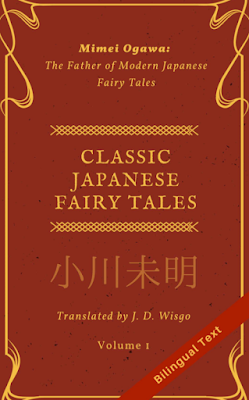“Classic Japanese Fairy-Tales [Volume 1]: Mimei Ogawa: The Father Of Modern Japanese Fairy-Tales” by Mimei Ogawa, translated by J.D. Wisgo
“Classic Japanese Fairy-Tales [Volume 1]: Mimei Ogawa: The Father Of Modern Japanese Fairy-Tales” is a new collection of Japanese fairy-tales translated into English by J.D. Wisgo (2018). This beautiful collection of six Japanese fairy-tales is precious and unique because it is the first publication of its kind: so widely available (unlike other publications of Ogawa’s) and with refreshed translations of classic tales, many of which are not widely known. Wisgo’s renderings of these stories are brilliant, extremely sensual and vivid, and full of poignant reflection without being overtly literary.
The six tales in this volume include: The Red Candle & The Mermaid, The Clockless Village, The Golden Hoops, Saffron Wine & The Desert Town, The Chocolate Candy Angel, and Many Years Later. To be sure, all of these are indeed fairy-tales (as opposed to fables). The lessons and meanings are subtle and abstract. When towns disappear is it due to bad luck or mermaids? Or, what is worse – having two clocks that tell different times or no clocks at all? And, would we recognize ourselves as angels? Also, what is the story behind what makes a place so glorious and mysterious? Moreover, how do angels fare when they visit the Earth? Lastly, if you wish hard enough for something, will it come true? These are just some things a reader might ponder after being in awe of these fairy-tales.
The simple and brief - but profound - nature of these fairy-tales makes each one a great inspiration for storytellers. In fact, J.D. Wisgo suggests that each should be read aloud. Every story included within this book is a time-capsule and portal into a world peering within the inner life of the soul: whether in human form or otherwise. Read “Classic Japanese Fairy-Tales [Volume 1]: Mimei Ogawa” to delight a child, or read this collection to yourself or your older aged loved ones, who will surely be delighted by them too. J.D. Wisgo’s translation keeps the essence of, as well as honors, Mimei Ogawa’s writing.
Note: the second half of the book is a translation, line by line, of the stories in their original Japanese, with J.D. Wisgo’s English translations underlining the script.



Comments
Post a Comment